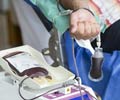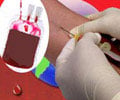‘Safe blood for all,’ emphasizes on universal access to safe blood and urges people to become blood donors on this World Blood Donor Day. WHO has been observing World Blood Donor Day every year on the 14th of June, since 2005.
Highlights:
- World Blood Donor Day has been observed on the 14th of June every year since 2005
- The theme this year is ‘Safe Blood For All’
- Availability of blood and blood products and the quality and safety of them remain a challenge
- Rwanda is the host country for this year’s World Blood Donor Day Celebrations
Read More..
Blood Donation – An Overview
Millions of lives are saved every year by way of transfusion of blood and blood products. Blood and blood products are critical in the care of the women during pregnancy and childbirth; severely anemic malnourished children; patients suffering from blood and bone marrow disorders; those with disorders of hemoglobin and immune deficiency conditions; for emergencies, accidents and disasters; and patients undergoing major surgeries. The need for blood and blood products is universal. However, the level of access to safe products within and across countries is still significantly different. Many countries face the added challenge of ensuring that quality assured and safe blood is accessible, alongside making sure adequate quantities of them are available as well.The day and the theme are also a call to action to all governments, national health authorities and blood services to set up systems and infrastructure and sufficient resources to increase collection of blood from voluntary donors and appropriately oversee the whole chain of blood transfusion.
Objectives of the 2019 Campaign
The following are the objectives of this year’s campaign:- To thank and celebrate individuals who have donated blood and to encourage others to start donating
- To highlight the need for dedicated year-round blood donation, maintaining adequate resources and universal access to safe blood transfusion
- Focussing on donor health and donor care in order to encourage regular donations
- To demonstrate the need for universal access to safe blood transfusion and provide advocacy to cement its place in achieving universal health coverage
- To mobilize support at all levels from governments and other partners to strengthen and sustain national blood programs
What Can We Do?
All individuals aged between 18 and 65 years, weighing at least 50 kg, in good health, without any infections are eligible to donate. Eligibility guidelines are specific to countries and must be understood well by all willing donors. Individuals must register as donors, donate regularly and also encourage family and friends to donate.Ministries of Health should organize events to celebrate Blood Donor Day, promote voluntary donations and acknowledge the role of voluntary blood donors. Provide adequate resources and appropriate infrastructure to facilitate voluntary blood donation. Set up quality assurance systems for blood and blood products. Engage with media to spread awareness and highlight the need for blood in meeting patient requirements.
National blood transfusion services should also engage in disseminating information related to blood donation and its importance. Organize blood donation drives and awareness programs for people to learn about blood donation. Work in tandem with the government to manage resources and infrastructure for blood donation and donor care.
WHO has put together an extensive range of campaign materials including social media kits. Posters, wallpapers for desktops and mobile phones and social cards with messages highlighting the theme and importance of blood donation are available for use. Promotional materials like mugs, caps, t-shirts, banners, pens and pins have also been designed.
Every few seconds someone, somewhere, needs blood and everyone one of them should have access to safe blood transfusion when required, as health is a human right. This is the key message that the WHO is trying to drive home and it is time we all listened to it and did our bit.
World Blood Donor Day – The Origin
A unanimous declaration was made by the ministers of health from across the world, in May 2005 at the Fifty-Eighth World Health Assembly to be committed to and support voluntary blood donation. The World Blood Donor Day was designated as an annual event to be held each year on 14th June through the WHA58.13 resolution.The resolution also implores the Member States to implement, and support well organized, appropriately regulated and supervised nationally-coordinated and sustainable blood programs. The governments of the various states must also allocate adequate funding to manage high-quality blood donation services to ensure the availability of safe blood to meet the needs of patients.
This was followed by the Melbourne Declaration in 2009 where experts in transfusion medicine, policy-makers and non-governmental representatives from 40 countries, set up a goal for all countries to have collected all their blood supplies from voluntary unpaid donors by 2020.
Safe Blood for All
The theme this year focuses on blood donation and universal access to safe blood transfusion, as a component of achieving universal health coverage. The theme aims to raise awareness about the universal need for safe blood and the importance of voluntary donations in achieving UHC. It also encourages people all over the world to donate blood regularly.References:
- World Blood Donor Day 2019 - (https://www.who.int/campaigns/world-blood-donor-day/2019)
Source-Medindia













